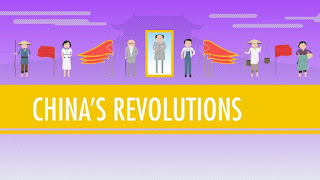 |
| Source:Five Prime- Chinese Communist Leader Mao Zedong. |
Source:
The New Democrat
"In its post-revolutionary period, Mao Zedong Thought is defined in the CPC's Constitution as "Marxism–Leninism applied in a Chinese context", synthesized by Mao and China's "first-generation leaders". It asserts that class struggle continues even if the proletariat has already overthrown the bourgeoisie and there are capitalist restorationist elements within the Communist Party itself. Maoism provided the CPC's first comprehensive theoretical guideline with regards to how to continue socialist revolution, the creation of a socialist society, socialist military construction and highlights various contradictions in society to be addressed by what is termed "socialist construction".
"While it continues to be lauded to be the major force that defeated "imperialism and feudalism" and created a "New China" by the Communist Party of China, the ideology survives only in name on the Communist Party's Constitution as Deng Xiaoping abolished most Maoist practices in 1978, advancing a guiding ideology called "socialism with Chinese characteristics".
“In its post-revolutionary period, Mao Zedong Thought is defined in the CPC’s Constitution as “Marxism–Leninism applied in a Chinese context”, synthesized by Mao and China’s “first-generation leaders”. It asserts that class struggle continues even if the proletariat has already overthrown the bourgeoisie and there are capitalist restorationist elements within the Communist Party itself. Maoism provided the CPC’s first comprehensive theoretical guideline with regards to how to continue socialist revolution, the creation of a socialist society, socialist military construction and highlights various contradictions in society to be addressed by what is termed “socialist construction”.
While it continues to be lauded to be the major force that defeated “imperialism and feudalism” and created a “New China” by the Communist Party of China, the ideology survives only in name on the Communist Party’s Constitution as Deng Xiaoping abolished most Maoist practices in 1978, advancing a guiding ideology called “socialism with Chinese characteristics”.
North Korea ( or as I call them the Communist Republic of Korea ) is really the last standing among the pure communist states around the world now. They’re the only communist state where everything and all the power in the country is centralized with the Communist Party and central government. The People’s Republic of China, has had a functioning hybrid capitalist economic for about 40 years now, while still maintaining some state-owned industries and they still qualify as a communist state because of their not just lack of free speech and a free press, but they still don’t have free speech or any free press.
The Chinese Communist State, still owns and operates all the domestic media in the country. And of course opposition parties to the Communist Party are still outlawed. But even personal freedom with people being able to move freely around the country and make their own basic personal and even economic decisions for themselves in the country and being able to travel abroad, is on the rise and has been growing in China since they’ve moved in a capitalist first world direction economically and culturally the last 35-40 years.
Mao Zedong, is one of the last of the pure Communists as someone who believed int total state-control of the society and not just the economy to work on behalf of the people so no one would be rich or poor. This is what Communists and Socialists are talking about when they say they want a classless society where no one is rich or poor. And they believe you achieve that by putting the central state in control of all the economic resources of the country. And that everyone would be taken care of as long as they follow the communist rules of society. Meaning you don’t disobey the communist regime and speak out against it or be politically active against it.








